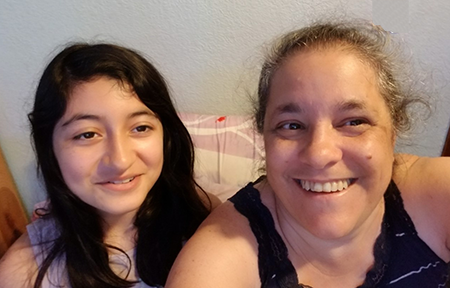
Sonya Spencer and granddaughter Alexis, putting in 100-percent effort on a selfie. Sonya is taking more personal time these days to help keep the grandkids focused on education and their future.
St. Vinnie’s Staffers Haunted, Driven By Time Spent Unhoused
Empathy is Job 1 at St. Vinnie’s, but not all staff members have walked in the shoes of our unhoused neighbors. Two have, and the experience continues to influence their daily lives. Sonya Spencer and Melinda Zugelder literally feel the pain of those who turn to St. Vincent de Paul for essential needs: food, shelter and clothing, and functioning family life.
Sonya and Melinda shared their experiences with homelessness – how it happened, how they felt, and how they managed to reverse course to become beloved co-workers at St. Vincent de Paul. They offer a few tips as well, for those who, by the grace of God, have never been without a home.
To Read Melinda’s Story Click Here.
We begin with Sonya Spencer, a case manager in SVdP’s Connections Transitional Housing program. She is one of two case managers tasked with guiding families out of homelessness, toward self-sufficiency. She is an intermediary, of sorts, between the timelines and expectations imposed by programs and funders, and the abilities of homeless individuals to meet them.
Raised from birth by relatives in Modesto, Calif., Sonya decided early that failure resulted from not working hard enough. She attended secretarial school and pursued the life she had always anticipated, that of a working mom. She was oblivious to homelessness, especially how it might pertain to her.
Sonya Spencer and granddaughter Alexis, putting in 100-percent effort on a selfie. Sonya is taking more personal time these days to help keep the grandkids focused on education and their future.
Two small children later, Sonya and her partner were settled and working when their landlord of six years abruptly asked them to leave. In reality, the unit should not have been rented, so the landlord would not provide a letter of recommendation.
On top of a two-hour daily commute in heavy traffic, it was enough to make a Eugene native like Sonya’s partner want to come home. The job market was good, and relatives promised assistance.
The jobs came easily, but the promised assistance mostly fell through. For eight months the family of four lived in the car, at campgrounds, in backyard tents, and in garages. With only short-term employment and no housing references, they felt trapped.
“I was tempted to go back to California and move in with my Mom,” Sonya admitted. “I stuck it through, and I know now that I would have regretted that choice today.”
Money that could have been saved for housing was squandered on the outrageous cost of living day to day, an aspect of homelessness that causes Sonya’s blood to boil. Even now, the feelings of fear, rejection, and unkindness lie shallow under her congenial surface.
Left unchecked, those feelings lead to a sense that nobody listens or cares, which is a “common denominator” among people experiencing homelessness, Sonya said. Any potentially productive meeting can erupt in anger and aggression, making it that much harder for a homeless individual to be heard, let alone qualify for services and move forward.
Affordable housing made the difference for Sonya’s family. They got on the waitlist and then into a ShelterCare unit. Sonya took every workshop and group session offered while her family waited for an opening.
“(Persistence) doesn’t always come out in your favor, but at the end of the day you know you did the job that needed doing.”
— Sonya Spencer, Connections Case Manager
Here’s where it pays to be a good neighbor. Back in California, old neighbors came through and wrote a letter verifying the past residency of Sonya and her family. It came just in time for them to clinch a three-bedroom unit at a cost of $355 per month. “That was the start for us,” Sonya remembered. “We did not return to being homeless.
“I am grateful for the groups and classes about financing and planning for the future. I learned to save and put housing payments above all else.”
Twenty-five years later, Sonya and her partner are homeowners. Still, Sonya can’t shake that fear of abruptly becoming homeless. In fact, she avoids the subject except when speaking with her Connections clients, as they appreciate her understanding, non-judgmental style.
In her work, Sonya acknowledges the range of factors that, combined with the high cost of housing, lead to or exacerbate homelessness. Some are concrete, like unpaid debt, criminal behavior, and poor work history; others touch on family dysfunction, mental issues and addiction. Each factor must be addressed for an individual to embrace personal change, and in a perfect world, each would be.
The key is, don’t give up, Sonya said. Whether it’s the families she counsels or her own grandkids, Alexis and Aiden, she encourages 100-percent effort.
“It doesn’t always come out in your favor,” she acknowledged, “but at the end of the day you know you did the job that needed doing.”

